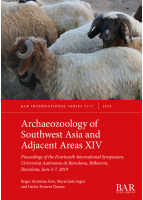Description
This volume represents a collection of papers resulting from the Archaeozoology of Southwest Asia Working group meeting held in Barcelona in 2019, when early-career and well-established researchers debated on nearly 10,000 years of adaptation and change in human-animal interactions. The 14 chapters in this volume range from the Neolithic to the Byzantine period, travelling through the regions of modern Turkey, Syria, Iran, United Arab Emirates, Oman and Egypt, among others.
Intertwining new archaeological and archaeozoological data, this volume reviews the development of complementary food acquisition strategies. These approaches to understanding fishing, hunting and husbandry practices discuss adaptation and perseverance against constant social, cultural, economic and political change. They reveal changes through time in food preferences, preparation and storage, the social value of animals, as well as their incredibly adaptive nature.
EDITORS
Roger Alcàntara Fors is currently a postdoctoral researcher in archaeozoology at the Autonomous University of Barcelona and Cardiff University. His research is focused on animal domestication, mobility and use, and exploitation in Southwest Asia and the Western Mediterranean using biomechanics and stable isotopes.
Carlos Tornero Dacasa is a postdoctoral researcher in archaeozoology and biogeochemistry at the Autonomous University of Barcelona and Catalan Institute of Human Palaeoecology and Social Evolution. His research revolves around animal domestication processes and early husbandry during the Neolithic in Southwest Asia, Eastern Europe and the Western Mediterranean.
Maria Saña Seguí is a professor in archaeology and archaeozoology at the Autonomous University of Barcelona. Her research has focused on the origins and development of early Neolithic societies in the Mediterranean basin through a range of archaeozoological approaches, developing and applying new and innovative techniques in the field.
List of contributors: Sarah Adcock, Benjamin Arbuckle, Mark Jonathan Beech, Jeremy A. Beller, Rémi Berthon, Ravindra Singh Bisht, Arpita Biswas, Douglas V. Campana, Pam J. Crabtree, Lorenzo d'Alfonso, Hossein Davoudi, Delphine Decruyenaere, Michele Degli Esposti, Arati Deshpande-Mukherjee, Nader Faraji, Azadeh Fatemeh Mohaseb, Haskel J.Greenfield, Noura Hamed Al Hameli, Youssef Hassanzadeh, Liora Kolska Horwitz, Omri Lernau, Kevin Lidour, Nathan Lovejoy, Marjan Mashkour, Marco Masseti, Henk K. Mienis, Kathryn R. Morgan, Eliezer D. Oren, Laurel A. Poolman, Scott J. Rufolo, Lidar Sapir-Hen, Giovanni Siracusano, Abra Spiciarich, Laura Strolin, Enrica Tagliamonte, Katie Tardio and Selena Vitezović.
REVIEWS
‘The papers in this volume present new zooarchaeological data based on traditional analysis of animal remains. I was particularly excited to see new approaches to fishing strategies, a topic which have not been that popular for quite some time. The data presented here will be valuable for researchers working in different regions as well since it will help them to contextualise their results and to recognise regional and supra-regional patterns.’ Dr Shyama Vermeersch, University of Oxford
‘Great to see another excellent addition to our knowledge of the zooarchaeology of Southwest Asia! Research in the region continues to thrive and this book offers new and fascinating stories about our past.’ Professor Umberto Albarella, University of Sheffield











